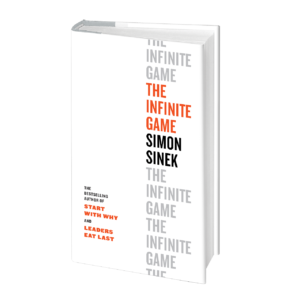
Simon Sinek’s newest book is terrific.
The best things in life take time.
Relationships deepen over time— if we tend to them.
Gardens thrive with constant vigilance.
The same holds true for businesses, organizations and communities.
We have to play the long game. We have to avoid the day traders.
I recently finished a book by Simon Sinek entitled “The Infinite Game”—which implores us to take the long view.
In case study after case study Mr. Sinek shows us how businesses focused on the endless/infinite horizon succeed where those with finite or zero sum mindsets fail. Oh they may have initial success—a day trader hits every now and then—but they always peter out because the game never ends. We must always plan for the future beyond us.
This sounds logical but in a world that values the next quarter or the next election or the next big game it’s often challenging to think infinitely.
But we must. Or we will fail.
This past week, I read stories about how the insurance market in California is unable to underwrite the risk posed by wildfires.
I shared on my social media, a heartfelt video made by my daughter’s college friend who lives in wildfire ravaged Australia which has been consumed by flames that have killed perhaps a billion creatures.
Science tells us climate change is either causing or exacerbating these and other situations including sea level rise which Delray Beach City Commission candidates discussed in a forum last week.
It will never be opportune to address these issues, but it will be necessary. Chances are any investment made today won’t “solve” or “end” the issue; those tasked with voting to spend the money likely won’t be around to declare victory. It’s also likely that victory will never be declared, we will have to continually tend to Mother Earth. It’s an infinite game.
Some of you may know that I have been involved with and rooting for a local beverage company called Celsius for about 10 years now. I’ve worked directly for Celsius and now for a large investor in the brand.
We believe in the company and that’s important because it is hard to build an international brand in a crowded space.
Many entrepreneurs get into the beverage space because if you make it, the rewards can be great.
Vitamin Water sold for a few billion dollars.
But if you scratch just below the headlines of big sales, successful IPO’s etc. you’ll find that most successes were long struggles, with hits and misses, successes and setbacks. You’ll find that the best brand builders don’t start companies to flip them—they start something because they want to change the world and that passion burns deep in their souls.
They don’t cut corners, they don’t hold back, they don’t source inferior ingredients or build shoddy products.
They dare to dream, are often told they are crazy and spend lots of time wandering the desert wondering if their toil will ever pan out but also sure that their vision is spot on.
It’s a weird dichotomy.
At Celsius, we learned that success wasn’t about running one magical ad, creating a “viral video” or hiring a celebrity spokesman (we did all three) it was about building a brand brick by brick through sampling events, distribution, consumer engagement, listening to retailers and getting close to your fans and your detractors because both can teach you things you need to know.
Obviously, there’s a lot more but the mindset has to be infinite and long term.
This is especially critical in building cities and communities.
I’m an idealist, so watching politics at any level is a painful experience for me.
How can I phrase this?
The field attracts a lot of….never mind… that’s not nice.
Let’s just say, I see a lot of hacks dressed up as “leaders.”
They shout to win the day’s scrum, go to sleep and repeat.
They are day traders and they get nothing done.
We can’t afford day traders.
There’s work to be done.
We need to play the infinite game and we need big thinkers willing to do what it takes to move the big rocks.
